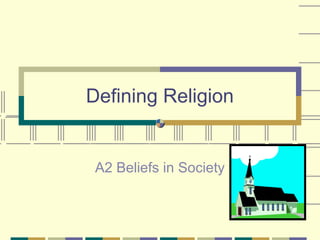
SociologyExchange.co.uk Shared Resource
- 1. Defining Religion A2 Beliefs in Society
- 3. “We have just enough religion to make us hate, but not enough to make us love one another.” Jonathon Swift 1711
- 4. “Religion is the opium of the people” Karl Marx 1843
- 5. “A Christian is a man who feels repentance on a Sunday for what he did on Saturday, and is going to do on Monday.” Thomas Russell Ybarra 1880
- 6. “So many gods, so many creeds, So many paths that wind and wind, While just the art of being kind Is all the sad world needs.” Francis Thompson 1913
- 7. “God seems to have left the receiver off the hook….and time is running out.” Arthur Koestler 1967
- 8. “Wherever God erects a house of prayer, The devil always builds a chapel there; And t’will be found on examination, The latter has the largest congregation.” Daniel Defoe 1701
- 9. Definitions Religion has been defined in many ways: 1. A belief in some kind of supernatural power 2. An expression of this belief in collective worship 3. A set of moral values which guide action 4. A force which brings people together and unifies society.
- 10. Substantive and Functional definitions of religion Substantive This sociological definition focuses on what religion is. 1. Belief in the supernatural 2. Relating to the scared
- 11. Belief in the supernatural The supernatural refers to power above the forces of nature. Max Weber saw religion as a belief in the supernatural. Involves a belief in beings, powers or forces superior to humans and which cannot be explained by Science.
- 12. Relating to the Scared Explanation provided by Emile Durkheim Key to religious beliefs is how society’s members relate to things which they view as sacred. People divide the world in things considered sacred and things considered profane
- 13. Things or people seen as scared evoke feelings of awe, respect and deference. A supernatural being such as a god is likely to be seen as sacred. However it seems anything can be seen as sacred. (e.g.) the resting place of a saint to Christians, a cow to a Hindu.
- 14. Functional Functional definitions stress how religions contribute to societies. According to Durkheim the key function of religion is to strengthen social solidarity and integration.
- 15. Functional definitions of religion are inclusive – allows us to include a wide range of beliefs and practices. Do not specify a belief in God or the supernatural. However just because an institution helps integrate people into society – it does not make it a religion.
- 16. Not religion!
- 17. Criticisms Not all cultures see a distinction between the natural and the supernatural-to many angels, spirits and Gods are real and a natural part of people’s experiences. If religion involves belief in the supernatural-is every supernatural belief religious (e.g.) witchcraft?
- 18. Criticisms Durkheim’s notion of the sacred has also been challenged as not being universally applicable. E.g. a saint who does not respond after long and repeated prayers may be severely admonished, the statue turned upside down and whipped.
- 19. Social constructionist definition Interpretivist view Based on how each member of society chooses to define religion No universal definition Doesn’t always involve a belief in God.
- 20. Example: Scientology Loved in some Banned in others!! countries
- 21. NOW THAT YOU HAVE DEFINITIONS OF RELIGION LOOK AT THE FOLLOWING EXAMPLES AND MAKE A DECISION….ARE THEY ACTS OF RELIGION OR NOT????
- 31. Sociological definitions McNeil (“Culture”, 1986) “Religion involves beliefs that explain experiences by claiming that there is a superhuman or supernatural agency of some kind, often a god or gods. It also involves rituals to express these beliefs in public and private ceremonies of worship. It provides a moral code to guide our everyday behaviour.”
- 32. Bilton et al (“Introductory Sociology”, 1990) “Religion may be said to be a system of beliefs about the individual’s place in the world, providing an order to that world and a reason for existence within it. However we cannot merely define religion as a system of beliefs that guides social action since…this is also true of science and magic. One must go further and suggest that the beliefs are supported by a community which we call a “church”.
- 33. Giddens (“Sociology”, 1989) “Religions involve a set of symbols, invoking feelings of reverence or awe and are linked to rituals or ceremonies (such as church services) practised by a community of believers. Whether or not the beliefs in a religion involve gods, there are virtually always beings or objects inspiring attitudes of awe and wonder…all religions involve ceremonials practised collectively by believers which normally occur in special places-churches, temples or ceremonial grounds. The existence of collective ceremonial is usually regarded as one of the main factors distinguishing religion from magic.